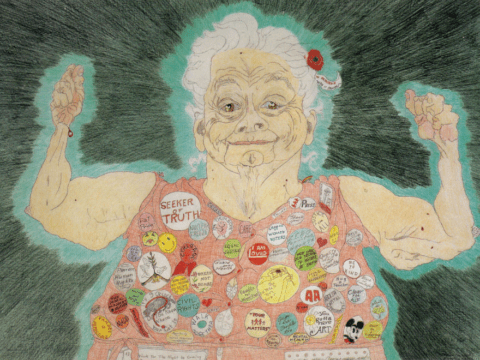In 1985, Lloyd Hurst retired after 23 years as a Canada Customs Officer at a small border town called Snowflake, Man. He and his wife, Ruth, moved to a house in Morden, Man., with two big apple trees in the backyard. Lloyd settled in quickly, becoming involved in the local United Church, the legion and the curling club. An avid woodworker, he would make wooden toy cars and trucks, selling them at craft sales. He and Ruth started travelling to Texas every winter, and golfing became another passion. It was an active life.
Lloyd was in his 60s when he and his family noticed something was different. Usually easy-going and quick to laugh, he started losing his temper. “He really had no patience — none. If something didn’t go right, he would instantly fly off the handle,” says his daughter-in-law Andrea Hurst.
You may unsubscribe from any of our newsletters at any time.
He began to forget things, too, wandering into a room and saying, “I can’t even remember what I was supposed to do.” Depression cloaked his life. He stopped walking places, opting to drive instead. “He quit everything and just ended up watching TV,” Andrea says. “Eventually, I think, he just gave up.”
Doctors were consulted, but only after Lloyd had surgery for a spinal stenosis in his neck did the family get a diagnosis. A magnetic resonance imaging test confirmed he had vascular dementia.
In this form of dementia, damage to the brain is caused by a stroke, sometimes one so small the patients themselves are not aware of it. Vascular dementia makes up 20 percent of dementias diagnosed in Canada, second only to Alzheimer’s disease at 63 percent. In most cases of vascular dementia, the patient also has Alzheimer’s disease, and doctors refer to this as “mixed dementia.”
Dementia is already the most significant cause of disability for Canadians over the age of 65, with patients numbering 480,600 in 2008. And as the baby boomers reach their senior years, this figure is expected to skyrocket. Experts warn of overwhelmed caregivers and soaring health-care costs. For churches, a pastoral challenge looms in aging congregations.
The projections are stark. According to the Alzheimer Society of Canada’s 2010 report Rising Tide: The Impact of Dementia on Canadian Society, the number of new cases of dementia diagnosed in 2008 was 103,700, or one new case every five minutes. By 2038, Rising Tide predicts there will be 257,800 new cases of dementia per year, or one new case every two minutes.
This means that in 26 years, 1,125,200 Canadians will have the disease, representing 2.8 percent of the population. The dementia epidemic will soon touch all of us in some way, whether as a patient, a caregiver or simply a taxpayer contributing to the health-care system.
When someone is diagnosed with dementia, “there is so much to learn and know,” Andrea Hurst says. “Everyone is affected differently, so it isn’t as black and white as people make it out to be.”
Diagnosing dementia is tricky. Alzheimer’s disease can still only be properly diagnosed with an autopsy to detect the telltale buildup of amyloid plaque and tangles of a protein called tau within the brain. Scientists are currently working on ways to identify the disease through imaging scans, but in the meantime, physicians use symptoms to make their diagnosis.
In older persons, symptoms of depression are sometimes confused with symptoms of dementia, and vice versa. People with depression typically have problems with attention and memory, and people with dementia often have some mood symptoms, like difficulty sleeping or reduced appetite, explains Linda Mah, a clinician scientist at Toronto’s Baycrest Centre for Geriatric Care. “Many clinicians will say, ‘Let’s hope it is just depression and treat it with an anti-depressant or offer some therapy,’” says Mah. With time, if it is dementia, the memory problems might become more evident.
Another big unknown is how quickly a person will decline after being diagnosed. “There is a lot of variability in the progression of Alzheimer’s disease and other dementias. Some people will progress very rapidly, and some people will progress very slowly,” says Morris Freedman, medical director at the Sam and Ida Ross Memory Clinic at the Baycrest Centre for Geriatric Care. “What is clear is that if someone develops another problem, like a head injury or a physical illness, their rate of decline is worse.” As dementia advances, it is sometimes accompanied by disruptive behaviours, such as resisting care, agitation, aggression and wandering.
One thing doctors are certain about is that dementia is not simply a normal part of aging. This January, the Alzheimer Society of Canada launched a campaign to educate the public about the need for early diagnosis. A survey of 958 caregivers revealed 44 percent of dementia patients waited a year to see a doctor after symptoms started because they considered the symptoms a side effect of aging or thought they would go away.
There are no medications that can cure dementia, although medications may halt the progression of symptoms for a short time. These work best if dementia is caught early. Early detection also helps people learn coping strategies to improve their quality of life and prepare for the later stages of the disease.
As Lloyd declined, Ruth was left responsible for all the upkeep of their home in Morden. It became too much for her to handle, so in 2008, the couple moved to Winnipeg to be closer to Andrea and her husband, Mike. Andrea and Mike drove them to medical appointments and helped Ruth with errands.
As Lloyd’s primary caregiver, Ruth lived in constant uncertainty, not knowing when he might unleash his new sharp tongue. Her husband’s personality had completely changed. He hardly walked and never went out. If the TV was on, it was loud. “It was just draining all around,” Andrea says.
Soon Ruth was not able to leave Lloyd alone for fear that he would fall. A home care nurse came twice a week, allowing her time to run errands. For a while Lloyd attended — and enjoyed — a program at a local long-term care facility, which gave Ruth a break one day a week. Lloyd benefited from it too. “He loved it. He would come back in a good frame of mind and was always anxious to go,” Andrea says.
Caring for a person with dementia takes its toll: emotionally, physically and financially. Depression among caregivers is common and can lead to deteriorating health overall. Results from the Canadian Study of Health and Aging, which followed 10,000 Canadian seniors from 1991 to 2001, show caregivers of people with dementia reported more health problems than other caregivers helping the elderly.
Then there is the financial burden, as many middle-aged children assume the task of caring for their parents with dementia. Taking time off work, paying for medications and home help, and travelling to medical appointments add up. In a study published in the Canadian Journal of Psychiatry in 2010, researchers from Sunnybrook Health Sciences Centre in Toronto followed a group of Alzheimer’s patients living in the community. The cost of caring for a person with Alzheimer’s ranged from $367 a month in the early stages of the disease to $4,063 a month in the later stages.
As Lloyd’s condition worsened, the impact on Ruth was hard to miss. “I think had it continued much longer, she would have been the one in the hospital,” Andrea says. And so two years ago, Lloyd moved into a long-term care facility in Winnipeg. He looked forward to frequent visits with his family, whom he always recognized.
Last November, Lloyd was admitted to hospital with a fever and low blood pressure. His prognosis was poor, so he was moved back to the care home and made comfortable for his last days. Andrea says he was very peaceful when he died on Nov. 15.
In Rising Tide, the Alzheimer Society of Canada estimates that while the direct health costs of dementia were more than $8 billion in 2008, they will rise to more than $92 billion a year by 2038. The study also predicts a severe shortfall of long-term care beds for dementia patients. This means there will be a shift toward more dementia patients living in the community and a dire need for more home care services to relieve the stress on caregivers.
The key to saving health-care costs and caregiver burnout is preventing dementia in the first place. While none of us are immune to dementia, researchers have found that what is good for the heart is good for the brain. Scientific evidence shows that treating high blood pressure helps prevent dementia, and exercising, quitting smoking, lowering cholesterol and eating a balanced diet might also ward off the disease. But don’t wait until your senior years to start getting healthy — a recent paper in the British Medical Journal showed cognitive decline is detectable as early as age 45.
Intriguingly, faith may have a role to play in prevention as well. In a study published in the scientific journal Neurology in 2007, Morris Freedman and colleagues examined the decline of 70 people with Alzheimer’s disease or mixed dementia over time. They found a significant relationship between less cognitive decline and high scores in spirituality. Carrying out private religious practices, such as praying at home, were also significantly associated with reduced cognitive decline.
Another scientific study published last year found elderly Protestants had less degradation in the hippocampus of the brain — the region known for memory processing — than Catholics or born-again Protestants. Atrophy of the hippocampus has been linked to Alzheimer’s disease and other dementias.
Faith might also be a tonic for caregivers. According to a 2007 study of 1,229 caregivers for persons with dementia, the devout had fewer depressive symptoms than those with weak or no religious beliefs.
While all the research warrants further study, it does suggest that faith, perhaps beyond the social benefits of worshipping with others, affects both our mental well-being and our brain health.
This is good news for churchgoers, but no magic shield. Many congregations are already struggling to care for their members with dementia, and the challenge will only intensify as patient numbers continue to grow. What happens when your church’s beloved organist forgets the chords of the postlude? How do you uplift the faith of a longtime parishioner who no longer recognizes you?
For Richard Manley-Tannis, deacon at Winnipeg’s United Church in Meadowood, where the Hursts are members, pastoral care begins with acceptance. There is no reversing the course of dementia; instead, it is important to just spend time with those affected, to be there in the moment with them. “I think that is why dementia becomes invisible, because we are so addicted to wanting to fix things,” he says. “Our responsibility is to be present in that illness, with the trust that people are willing to extend to us.”
Since Lloyd’s death, Ruth has been going out more and participating in activities in her building. Lloyd is missed, and comments such as “He would have loved this” or “He would have had something to say about that!” pepper the family’s conversation, Andrea says. At Christmas this year, Ruth gave Mike a glass inkwell that had once been given to Lloyd by his father. It was something she had kept safe during all their moves. A fragile thing, yet treasured, not unlike the human brain.
***
This story first appeared in The United Church Observer’s March 2012 issue with the title “The silent epidemic.”














